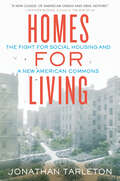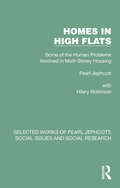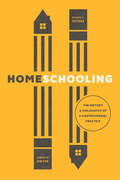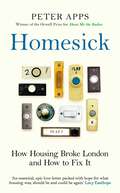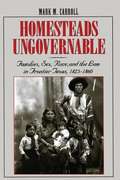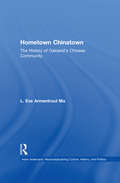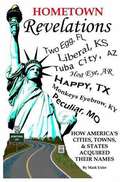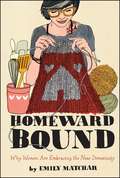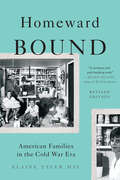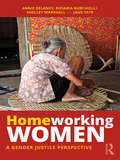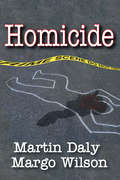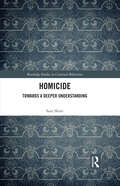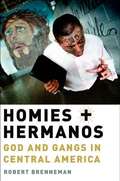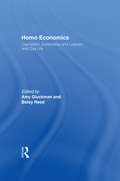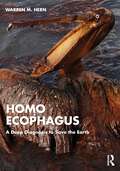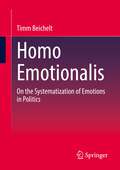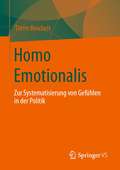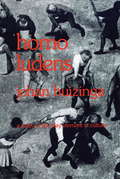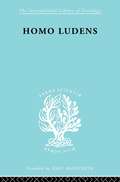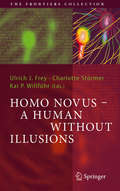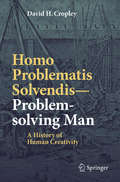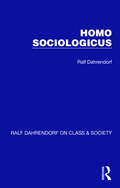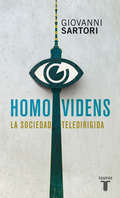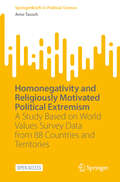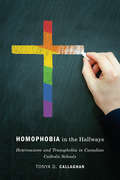- Table View
- List View
Homes for Living: The Fight for Social Housing and a New American Commons
by Jonathan TarletonA tale of 2 NYC affordable housing co-ops&’ struggle over privatization, public goods, and the future of American housingThe American Dream of homeownership is becoming an American Delusion. As renters seek an escape from record-breaking rent hikes, first-time buyers find that skyrocketing interest rates and historically low inventory leave them with scant options for an affordable place to live. With home valued more than ever as a commodity, even social housing programs meant to insulate families from cut-throat markets are under threat—sometimes by residents themselves.In Homes for Living, urban planner and oral historian Jonathan Tarleton introduces readers to 2 social housing co-ops in Brooklyn and Manhattan. Longtime residents of St. James Towers and Southbridge Towers lock horns over whether to maintain the rules that have kept their homes affordable for decades or to cash out at great personal profit, thereby denying future generations the same opportunity to build thriving communities rooted in mutual care.With a deft hand for mapping personal histories atop the greater housing crisis, Tarleton explores housing as a public good, movements for tenant rights and Indigenous sovereignty, and questions of race and class to lay bare competing visions of what ownership means, what homes are for, and what neighbors owe each other.
Homes in High Flats: Some of the Human Problems Involved in Multi-Storey Housing (Selected Works of Pearl Jephcott: Social Issues and Social Research)
by Pearl JephcottOriginally published in 1971, Homes in High Flats was written at a time when multi-storey flats were a popular solution to the world-wide need for mass housing because they could be produced with speed. However, the social implications of domestic housing in high flats were causing local authorities in Western Europe to reconsider their efficiency. Original research into this question forms the basis of this book which concentrates on Glasgow but gives attention to other examples both in Britain and abroad. The text attempts to encompass all the social and practical aspects of life in high flats by studying tenants’ views on the physical character of the flats and estates, and by examining the success of tenants’ associations and extra-mural classes designed to develop community life. Practical problems are dealt with in chapters on facilities and services, families, children, the elderly and the case for investment in staff. The authors also compare multi-storey flats with other types of household and discuss the reasons for tenants’ movement out of the estate. Perhaps the most eloquent social comment on the shortcomings of high flat life is expressed in the lyrics of the Jeely Piece Song which is included in the Appendix.
Homeschooling: The History & Philosophy of a Controversial Practice (History and Philosophy of Education Series)
by James G. DwyerIn Homeschooling: The History and Philosophy of a Controversial Practice, James G. Dwyer and Shawn F. Peters examine homeschooling’s history, its methods, and the fundamental questions at the root of the heated debate over whether and how the state should oversee and regulate it. The authors trace the evolution of homeschooling and the law relating to it from before America’s founding to the present day. In the process they analyze the many arguments made for and against it, and set them in the context of larger questions about school and education. They then tackle the question of regulation, and they do so within a rigorous moral framework, one that is constructed from a clear-eyed assessment of what rights and duties children, parents, and the state each possess. Viewing the question through that lens allows Dwyer and Peters to even-handedly evaluate the competing arguments and ultimately generate policy prescriptions. Homeschooling is the definitive study of a vexed question, one that ultimately affects all citizens, regardless of their educational background.
Homesick: How Housing Broke London and How to Fix It
by Peter AppsFrom the author of the Orwell Prize-winner SHOW ME THE BODIES: HOW WE LET GRENFELL HAPPEN, the gripping story of how housing defines a city's past, present and future 'Apps set the gold standard with his Grenfell coverage. With Homesick, he dismantles the sham of UK housing policy – razor-sharp, stylish, and morally unflinching.' Darren McGarvey In London, only those with vast cash deposits can get on the property ladder, private rents have spiralled out of control and the wait for social housing is measured in decades. Once vibrant communities are being uprooted, schools are closing down and homelessness is rampant. It was not always like this. In the 1980s, builders and nurses could afford family-sized homes, there was abundant social housing and long-term security for private renters. Tracing the last forty years of housing policy, Peter Apps examines this transformation, following a diverse group of Londoners as their fortunes rise and fall across the decades amid the economic forces sweeping through the city. With clear-eyed urgency, he reveals what will happen when a generation of renters retires and climate change brings fire and flood to a city unprepared for extremes. He also gives us reason to hope, exploring the ways London can transform again: from a market for private profit to a place that once more offers permanence, safety and opportunity for its citizens. A place to call home.
Homesteads Ungovernable: Families, Sex, Race, and the Law in Frontier Texas, 1823-1860
by Mark M. CarrollWhen he settled in Mexican Texas in 1832 and began courting Anna Raguet, Sam Houston had been separated from his Tennessee wife Eliza Allen for three years, while having already married and divorced his Cherokee wife Tiana and at least two other Indian "wives" during the interval. Houston's political enemies derided these marital irregularities, but in fact Houston's legal and extralegal marriages hardly set him apart from many other Texas men at a time when illicit and unstable unions were common in the yet-to-be-formed Lone Star State.<P>In this book, Mark Carroll draws on legal and social history to trace the evolution of sexual, family, and racial-caste relations in the most turbulent polity on the southern frontier during the antebellum period (1823-1860). He finds that the marriages of settlers in Texas were typically born of economic necessity and that, with few white women available, Anglo men frequently partnered with Native American, Tejano, and black women. While identifying a multicultural array of gender roles that combined with law and frontier disorder to destabilize the marriages of homesteaders, he also reveals how harsh living conditions, land policies, and property rules prompted settling spouses to cooperate for survival and mutual economic gain. Of equal importance, he reveals how evolving Texas law reinforced the substantial autonomy of Anglo women and provided them material rewards, even as it ensured that cross-racial sexual relationships and their reproductive consequences comported with slavery and a regime that dispossessed and subordinated free blacks, Native Americans, and Tejanos.
Hometown Chinatown: A History of Oakland's Chinese Community, 1852-1995 (Studies in Asian Americans)
by Eva Armentrout MaFocusing on the local history of the Chinese in Oakland, California, this study examines common stereotypes in the early Chinese community and Chinatown organizations.
Hometown Revelations: How America's Cities, Towns, and States Acquired Their Names
by Mark UslerSo, how did my hometown acquire its name? In Hometown Revelations, you will find many of these answers revealed. Some names sound normal but others have very unique stories. Most of the major cities are included in this book but you can also find out why they named their hometown, Peculiar, Missouri. In addition, find out how your state acquired its name. Not everybody's hometowns may be included but the clues and mysteries revealed of other communities may lead you to your own revelation.
Homeward Bound
by Emily MatcharWhat happens to our society as a whole when smart, high-achieving young women are honing their traditional homemaking skills? Emily Matchar offers a smart investigation into this return to domesticity.There's no doubt about it: domesticity is enjoying a major comeback, with the explosion of "stitch n' bitch" knitting circles; our sudden fascination with canning, cheese-making, and grinding our own flour; and a tidal wave of memoirs in the "I quit my corporate job and found fulfillment on a Vermont goat farm" vein. Why are women embracing the labor-intense domestic tasks that our mothers and grandmothers so eagerly shrugged off? Why has the image of the blissfully domestic, vintage-clad supermom become the media's feminine ideal?In The New Cult of Domesticity, Emily Matchar offers an investigation into how New Domesticity is fundamentally reshaping the role of women in society, and what the consequences might be. With research spanning from coast to coast, Matchar introduces us to a diverse cast of characters--Southern food bloggers, "radical homemakers" on the East Coast, Etsy entrepreneurs in Provo, members of urban knitting circles in Austin, and many more. She identifies the negative elements of these trends along with the positive, ultimately suggesting that this return to domesticity goes a step too far, to the detriment of both men and women alike.
Homeward Bound: American Families in the Cold War Era
by Elaine Tyler MayWhen Homeward Bound first appeared in 1988, it altered the way we understood Cold War America. The post-World War II era was thought of as a time when Americans turned away from politics to enjoy the fruits of peace and prosperity, while their leaders remained preoccupied with the dangers of the Atomic Age. Elaine Tyler May demonstrated that the Cold War infused life on every level from the boardroom to the bedroom. This new edition includes up-to-date information and references, along with an epilogue that examines how the legacy of the Cold War has shaped America since September 11, 2001.
Homeworking Women: A Gender Justice Perspective
by Shelley Marshall Annie Delaney Rosaria Burchielli Jane TateHomework; work that is categorised as informal employment, performed in the home, mainly for subcontractors and mostly undertaken by women. The inequities and injustices inherent in homework conditions maintain women’s weak bargaining position, preventing them from making any improvements to their lives via their work. The best way to tackle these issues is not to abolish, but to bring equality and justice to homework. This book contributes a gender justice framework to analyse and confront the issues and problems of homework. The authors propose four justice dimensions – recognition, representation, rights and redistribution – to examine and analyse homework. This framework also takes into account the structures and processes of capitalism and the patriarchy, and the relations of domination that are widely held to be the major factors that determine homework injustice. The authors discuss strategies and approaches that have worked for homeworkers, highlighting why they worked and the features that were beneficial for them. Homeworking Women will be of interest to individuals and organisations working with or for the collective benefit of homeworkers, academics and students interested in feminism, labour regulation, informal work, supply chains and social and political justice.
Homicide: Foundations of Human Behavior (Foundations of Human Behavior)
by Martin Daly Margo WilsonThe human race spends a disproportionate amount of attention, money, and expertise in solving, trying, and reporting homicides, as compared to other social problems. The public avidly consumes accounts of real-life homicide cases, and murder fiction is more popular still. Nevertheless, we have only the most rudimentary scientific understanding of who is likely to kill whom and why. Martin Daly and Margo Wilson apply contemporary evolutionary theory to analysis of human motives and perceptions of self-interest, considering where and why individual interests conflict, using well-documented murder cases. This book attempts to understand normal social motives in murder as products of the process of evolution by natural selection. They note that the implications for psychology are many and profound, touching on such matters as parental affection and rejection, sibling rivalry, sex differences in interests and inclinations, social comparison and achievement motives, our sense of justice, lifespan developmental changes in attitudes, and the phenomenology of the self. This is the first volume of its kind to analyze homicides in the light of a theory of interpersonal conflict. Before this study, no one had compared an observed distribution of victim-killer relationships to "expected" distribution, nor asked about the patterns of killer-victim age disparities in familial killings. This evolutionary psychological approach affords a deeper view and understanding of homicidal violence.
Homicide: Towards a Deeper Understanding (Routledge Studies in Criminal Behaviour)
by Sara Skott SöderholmHomicide: Towards a Deeper Understanding offers an in-depth analysis into the phenomenon of homicide, examining different types of homicide and how these types have changed over time. Based on original analysis on Scottish data, this book draws upon an international body of research to contextualize the findings in a global setting, filling an important gap in the homicide literature pertaining to the relationship between trends in homicide and violence. Examining homicide from gendered as well as Gothic perspectives, this book also relates homicide to novel, critical theory. The book covers a thorough description of different types of homicide, including sexual homicide, and provides an explorative approach to the identification of homicide subtypes. The book also explores how these findings relate to current homicide theory, and proposes a new theoretical framework to gain a deeper understanding of this crime. The main argument of the book is that if homicide and its relationship to wider violence is to be fully understood, theoretically as well as empirically, this crime needs to be disaggregated in a way that reflects the underlying data. Overall, this book therefore fills an important gap in criminological literature, providing an in-depth understanding of one of the most serious violent crimes.
Homies and Hermanos: God and Gangs in Central America
by Robert BrennemanWhy would a gun-wielding, tattoo-bearing "homie" trade in la vida loca for a Bible and the buttoned-down lifestyle of an evangelical hermano (brother in Christ)? To answer this question, Robert Brenneman interviewed sixty-three former gang members from the "Northern Triangle" of Central America―Guatemala, El Salvador, and Honduras―most of whom left their gang for evangelicalism. <p><p> Unlike in the United States, membership in a Central American gang is hasta la morgue. But the most common exception to the "morgue rule" is that of conversion or regular participation in an evangelical church. Do gang members who weary of their dangerous lifestyle simply make a rational choice to opt for evangelical religion? Brenneman finds this is only partly the case, for many others report emotional conversions that came unexpectedly, when they found themselves overwhelmed by a sermon, a conversation, or a prayer service. An extensively researched and gritty account, Homies and Hermanos sheds light on the nature of youth violence, of religious conversion, and of evangelical churches in Central America.
Homo Economics: Capitalism, Community, and Lesbian and Gay Life
by Betsy Reed Amy GluckmanHomo Economics is the first honest account of the tense relationship between gay people and the economy. This groundbreaking collection brings together a variety of voices from the worlds of journalism, activism, academia, the arts, and public policy to address issues including the recent economic history of the gay community, the community's response to its changing economic circumstances, and the risks inherent in a narrow definition of liberation.
Homo Ecophagus: A Deep Diagnosis to Save the Earth
by Warren M. HernHomo Ecophagus by Warren M. Hern is a wide-ranging look at the major problems for the survival of not just the human species, but all other species on Earth due to human activities over the past tens of thousands of years. The title of the book indicates Hern’s new name for the human species: “The man who devours the ecosystem.” Over the course of its evolution, Hern observes, humans have evolved cultures and adaptations that have now become malignant and that the human species, at the global level, has all the major characteristics of a malignant neoplasm ・ converting all plant, animal, organic, and inorganic material into human biomass or its adaptive adjuncts and support systems. Hern contends that this process is incompatible with continued survival of the human species and most other species on the planet, offering a diagnosis and prognosis of the current environmental impasse.
Homo Emotionalis: On the Systematization of Emotions in Politics
by Timm BeicheltIn this book, important works and approaches of policy-oriented emotion research are brought into a systematic context. For this purpose, three different types of emotions are elaborated, which in their totality constitute Homo Emotionalis: binary emotions, basic emotions, reflexive emotions. They correspond to individual-psychological stages of development, but are also relevant in the social and political handling of emotions. The interplay of emotion types and social constellations leads to different modes of political action, which shape different forms of emotional politics. In each case, individual logics emerge along which emotional politics is pursued. With its interdisciplinary focus, this volume is aimed at political scientists, anthropologists, sociologists and social psychologists.
Homo Emotionalis: Zur Systematisierung von Gefühlen in der Politik
by Timm BeicheltIn diesem Buch werden wichtige Werke und Ansätze der politikorientierten Emotionenforschung in einen systematischen Zusammenhang gebracht. Dafür werden drei unterschiedliche Typen von Emotionen herausgearbeitet, die in ihrer Gesamtheit den Homo Emotionalis ausmachen: binäre Emotionen, Basisemotionen, reflexive Emotionen. Sie entsprechen individualpsychologischen Entwicklungsstufen, sind aber auch im sozialen und politischen Umgang mit Emotionen relevant. Das Zusammenspiel von Emotionentypen und gesellschaftlichen Konstellationen führt zu verschiedenen Modi politischen Handelns, die unterschiedliche Formen von emotionaler Politik prägen. Es entstehen jeweils eigene Logiken, entlang derer Emotionenpolitik betrieben wird. Der Band richtet sich mit seinem interdisziplinären Fokus an Politikwissenschaft*innen, Anthropolog*innen, Soziolog*innen und Sozialpsycholog*innen.
Homo Ludens
by Johan Huizinga"A happier age than ours once made bold to call our species by the name of Homo Sapiens. In the course of time we have come to realize that we are not so reasonable after all as the Eighteenth Century with its worship of reason and naive optimism, though us; "hence moder fashion inclines to designate our species as Homo Faber: Man the Maker. But though faber may not be quite so dubious as sapiens it is, as a name specific of the human being, even less appropriate, seeing that many animals too are makers. There is a third function, howver, applicable to both human and animal life, and just as important as reasoning and making--namely, playing. it seems to me that next to Homo Faber, and perhaps on the same level as Homo Sapiens, Homo Ludens, Man the Player, deserves a place in our nomenclature."--from the Foreward, by Johan Huizinga
Homo Ludens Ils 86: Proeve Eener Bepaling Van Het Spel-element Der Cultuur (International Library of Sociology)
by J. HuizingaFirst published in 1998. Routledge is an imprint of Taylor & Francis, an informa company.
Homo Novus - A Human Without Illusions
by Ulrich J. Frey Kai P. Willführ Charlotte StörmerConverging evidence from disciplines including sociobiology, evolutionary psychology and human biology forces us to adopt a new idea of what it means to be a human. As cherished concepts such as free will, naïve realism, humans as creation's crowning glory fall and our moral roots in ape group dynamics become clearer, we have to take leave of many concepts that have been central to defining our humanness. What emerges is a new human, the homo novus, a human being without illusions. Leading authors from many different fields explore these issues by addressing a range of illusions and providing evidence for the need, despite considerable reluctance, to relinquish some of our most cherished ideas about ourselves.
Homo Problematis Solvendis–Problem-solving Man: A History of Human Creativity
by David H. CropleyThis book presents the history of modern human creativity/innovation through examples of solutions to basic human needs that have been developed over time. The title – Homo problematis solvendis – is a play on the scientific classifications of humans (e.g. Homo habilus, Homo erectus, Homo sapiens), and is intended to suggest that a defining characteristic of modern humans is our fundamental ability to solve problems (i.e. problem- solving human = Homo problematis solvendis). The book not only offers new perspectives on the history of technology, but also helps readers connect the popular interest in creativity and innovation (in schools, in businesses) with their psychological underpinnings. It discusses why creativity and innovation are vital to societies, and how these key abilities have made it possible for societies to develop into what they are today.
Homo Sociologicus (Ralf Dahrendorf on Class & Society #3)
by Ralf DahrendorfFirst published in English as part of the Essays in the Theory of Society, this volume reissues the stand-alone Homo Sociologicus for which the author wrote a new introduction when it was originally published in 1973. The controversial book deals with the history, significance and limits of the category of social role and discusses the dilemma posed by homo sociologicus. The author shows that for society and sociology, socialization invariably means depersonalization, the yielding up of man’s absolute individuality and liberty to the constraint and generality of social roles. This volume includes the essay, Sociology and Human Nature, written as a postscript to Homo Sociologicus.
Homo videns: La sociedad teledirigida (Pensamiento Ser.)
by Giovanni SartoriUn clásico sobre la constante transformación del hombre ante la sociedad de la imagen. Nos encontramos en plena revolución multimedia. El homo sapiens, producto de la cultura escrita, se está transformando en un homo videns para el cual la palabra ha sido destronada por la imagen. Y en todo ello la televisión cumple un papel determinante. La primacía de lo visible sobre lo inteligible lleva a un ver sin entender que ha acabado con el pensamiento abstracto, con las ideas claras y distintas. Ésta es la premisa fundamental a partir de la cual el gran pensador italiano Giovanni Sartori examina en esta obra -ya clásica y, sin embargo, hoy más actual que nunca- la vídeo-política y el poder político de la televisión; la conversión del vídeo-niño en un adulto sordo de por vida a los estímulos de la lectura y del saber transmitidos por la cultura escrita; la formación de la opinión pública, y la cantidad de saber que pasa -y no pasa-a través de los canales de comunicación de masas. Ante el avance imparable de la edad multimedia ¿aparecerá una nueva forma de pensar, un postpensamiento acorde a la nueva cultura audiovisual? Reseñas:«Un ensayo polémico y exasperadamente inteligente, que reivindica la complejidad de la palabra frente a las videosimplezas, y el conocimiento frente a la mera información.»Fernando Savater «Un libro estimulante que va contracorriente. Un aguijón para despabilar a las víctimas de la videoanestesia, una contribución al salvamento de la cultura, una invitación a buscar la realidad en la maraña de la sobreinformación y de la imagen, que a veces desconcierta y "también miente"... Sartori sostiene que el consumo de televisión está creando un hombre empobrecido, crédulo, inocentón y marcado por la atrofia cultural.»Justino Sinova, El Mundo «Un alegato contra el poder de la televisión, contra la falsa creencia de que una imagen vale más que mil palabras y una llamada de alerta ante los efectos negativos producidos en toda una generación que ha conocido las imágenes televisivas antes que la letra impresa.»Ángel Vivas, El Mundo «Este magnífico ensayo de Giovanni Sartori debería ser de lectura obligatoria en todas las escuelas y universidades.»Il Gazzettino «Un libro que arrastra: cuando el ataque es así de violento pero a la vez tan agudo, así de desconcertante pero tan soberbiamente ultrajoso en comparación con la torpeza tecnológica, implica que ya no conseguiremos acercarnos mas a una realidad sin por ello cambiar radicalmente la desoladora relación que tenemos con ella.»Corriere della Sera «El nuevo libro de Giovanni Sartori es un feroz alegato contra la televisión y una señal de alarma frente a los desastres que este potente medio de comunicación está introduciendo en la naturaleza y en las costumbres de nuestra especie. [...] El politólogo da la voz de alarma: la multimedialidad y la videocracia son un terrible autogol de la humanidad.»L'Espresso
Homonegativity and Religiously Motivated Political Extremism: A Study Based on World Values Survey Data from 88 Countries and Territories (SpringerBriefs in Political Science)
by Arno TauschThis open access book describes the world’s increasingly multicultural societies face the problem that more and more diverse lifestyles (LGBTQIA+ communities) are not universally accepted, and that today, in addition to xenophobia, racism and anti-Semitism, there is substantial homonegativity. This book explores this issue, reviews the empirical literature on the subject and provides new empirically based evidence on a global and European scale. Based on an analysis of The World Values Survey using the statistical software SPSS, it provides a scientifically sound answer to the question of which social groups in Europe and around the globe are more homophobic and which are less, together with insights into the multivariate relationships between homonegativity and religiously motivated political extremism. The extensive and representative statistical samples allow cautious conclusions to be drawn for smaller religious groups in the European Union and other countries around the world.
Homophobia in the Hallways: Heterosexism and Transphobia in Canadian Catholic Schools
by Tonya D. CallaghanSection 15 of the Canadian Charter of Rights and Freedoms ensures equality regarding sexual orientation and gender identity in Canada. Despite this, gay, lesbian, and gender-nonconforming teachers in publicly-funded Catholic schools in Ontario and Alberta are being fired for living lives that Church leaders claim run contrary to Catholic doctrine about non-heterosexuality; meanwhile, requests from students to establish Gay/Straight Alliances are often denied. In Homophobia in the Hallways, Tonya D. Callaghan interrogates institutionalized homophobia and transphobia in the publicly-funded Catholic school systems of Ontario and Alberta. Featuring twenty interviews with students and teachers who have faced overt discrimination in Catholic schools, the book blends theoretical inquiry and real-world case study, making Callaghan’s study a unique insight into religiously-inspired heterosexism and genderism. She uncovers the causes and effects of the long-standing disconnect between Canadian Catholic schools and the Charter by comparing the treatment of and attitudes towards lesbian, gay, bisexual, transgender and queer teachers and students in these publicly-funded systems.
